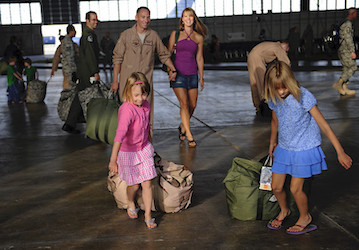Separations can be tough on military families. But many families can—and do—learn to adapt. When a partner or parent is away, those at home need to shift their roles and responsibilities to cover for the person who’s absent. When the Service Member returns home, then the family must shift roles again. These “accordion families” must contract and expand as family members are home or away. Some families handle this smoothly. Others find it an additional hurdle to overcome with each deployment or extended training.
You can make this challenge more manageable. Ask yourself the following questions about how your family handles separations. The answers will help you come up with a plan that works for everyone.
Assess emotional needs
- When you’re apart, do you emotionally distance yourself from your partner? Or do you become more “needy”?
- How does your partner act when you’re apart?
- Do you have different emotional needs when you’re apart?
- If you have children, how do they behave during separations? Do they act out, withdraw, share their emotions, or something else?
- How do you and your family handle limited communication?
It can be tough to avoid conflict if you and your partner have different emotional needs. One way to address that is to find common ground. Then, make a game plan that works for both of you whether you’re at home or apart.
For example, think about how you best handle stress. If you need to talk out your frustrations, let you partner know so you can set a time to check in every day. Or, tell your partner if you prefer to tackle your “to-dos” on your own. Either way, try to set up some time each week to do something fun together. And be sure you’re on the same page about how often you’d like to communicate. It might not always be possible, but setting a goal that works for both of you is a good first step.
If you have kids, remember: They don’t always have the same ability as you do to identify and talk about their emotions clearly. Watch out for behavior changes to see if they’re struggling. Also keep in mind that children will often show signs of emotional stress through physical symptoms, so pay special attention to any sickness or pain you might see.
Examine roles and relationships
- How do you shift roles around parenting and discipline?
- Do you expect more or less from your kids when one parent it gone?
- Do other relationships (for example, with extended family or friends) shift during a separation? If so, in what way?
It’s normal—and necessary—for roles to change when a member of the family is gone. The mom or dad at home is likely to take on more of the parenting responsibilities, including discipline. Meanwhile, older children might become more independent and take on more responsibility, such as doing more chores around the house and helping with younger siblings. Sometimes parents expect kids to take on more without having a discussion about it, which can create conflict and frustration.
Think about who will be expected to take on what, set clear and realistic expectations, and talk about it together. And remember, when the separation is over, it might not make sense for things to go “back to normal.” Think about how things have shifted, what has worked and what hasn’t, and move toward a “new normal.”
Do an after-action review
- Looking back on how you and your family adapted, what are you most proud of?
- Are there specific things you’d like to prepare more (or differently) for next time?
- What adjustments would you like to keep as a part of your “new normal”?
A few weeks after your family is reunited, take some time to reflect on the experience, and talk through the best way to make changes in the future.
